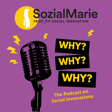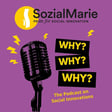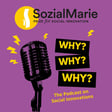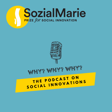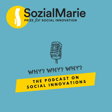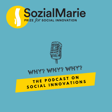
Episode 10: What Makes a Winning Project? Ana Jeinić on the SozialMarie Jury
Welcome to Episode 10 of the Why Why Why? podcast, brought to you by SozialMarie! Have you ever wondered what goes on behind the scenes when selecting the winners of a prestigious social innovation award? In this episode, we’re giving you a rare peek inside the SozialMarie jury process with Ana Jeinić, an architectural theorist, researcher, and juror representing Croatia. She shares what makes an application stand out, how the jury debates and evaluates projects, and why this process isn’t just about picking winners—it’s also a transformative experience for the jury members themselves.
Ana Jeinić is an architectural thinker and curator who explores how space, cities, and design shape our world. With a background in architecture and philosophy, she has worked as a professor, researcher, and curator, leading projects that challenge how we imagine the future of architecture and urban planning. She has written extensively on topics like infrastructure, environmental philosophy, and speculative design. From organizing international projects to experimenting with utopian city concepts, Ana is deeply engaged in rethinking the role of architecture in our lives. Since 2023, she has been leading an artistic research project at Graz University of Technology.
